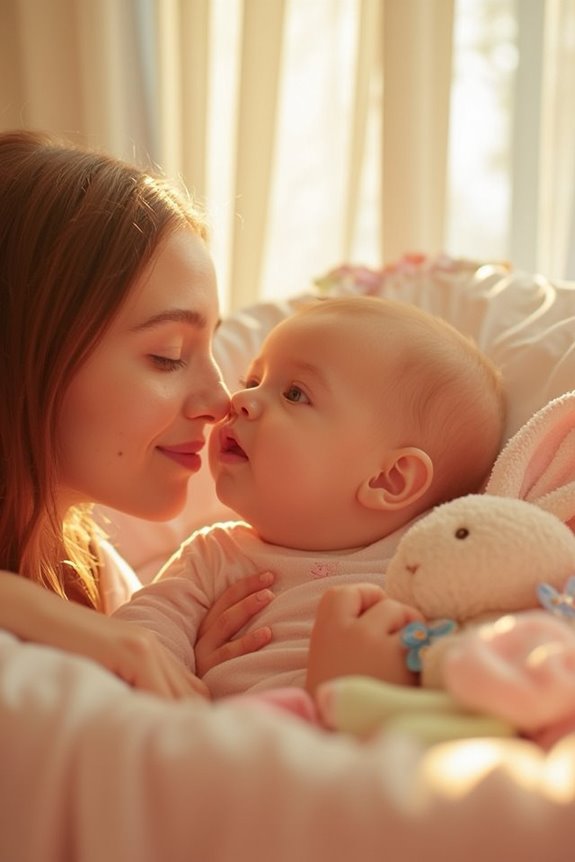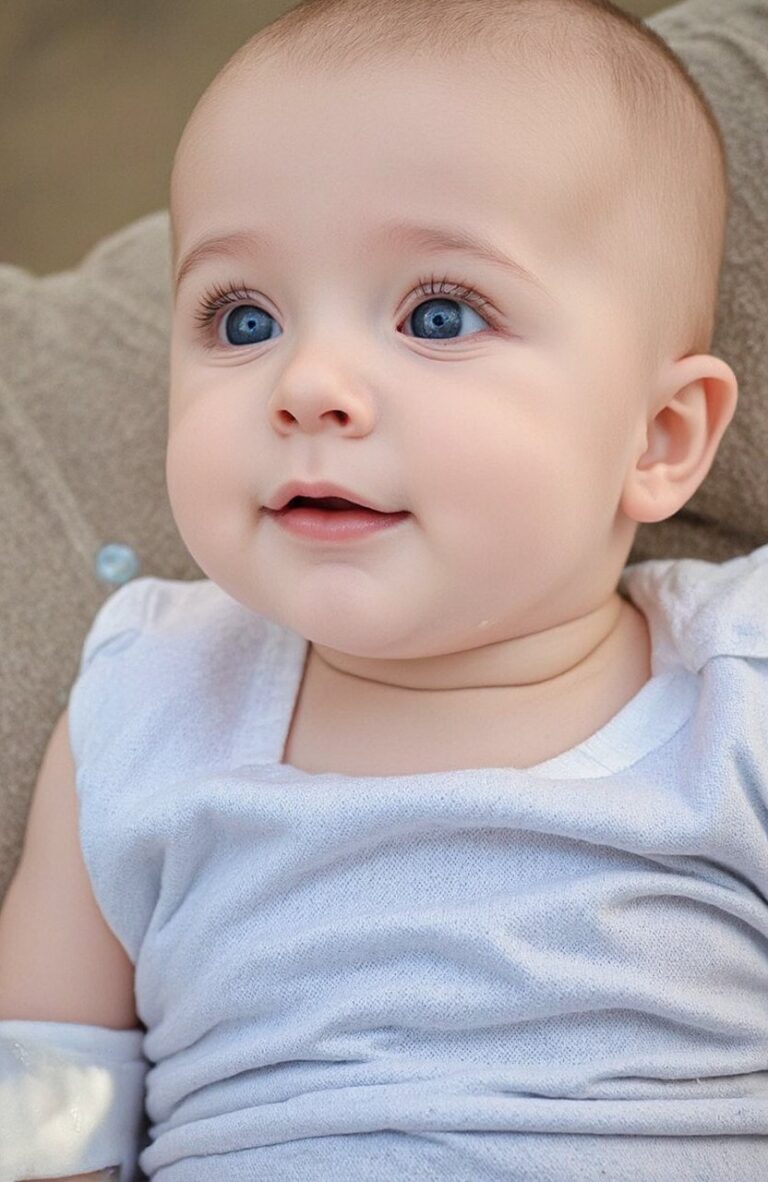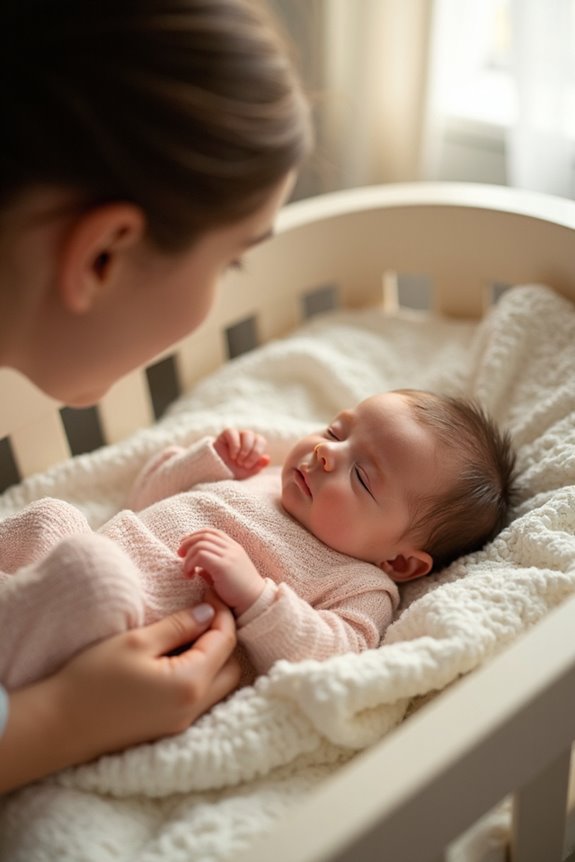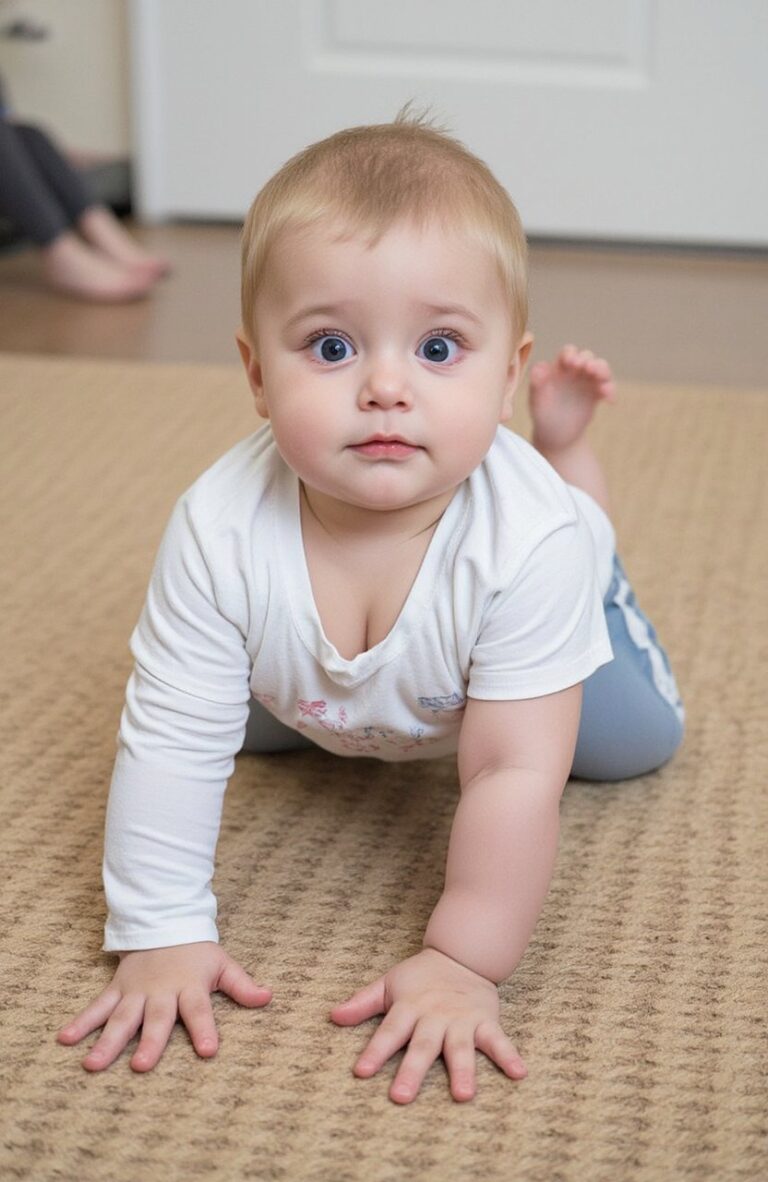Most babies say their first word around 12 months, but it can vary. Some might surprise us by talking as early as 9 or 10 months, while others may wait until 14 to 18 months. Factors like environment, genetics, and even personality play a role in this. Common first words are often names for family, animals, or basic greetings. To support your child’s language growth, many helpful strategies can enhance their journey. Let’s explore those together.
Key Takeaways
- Babies typically say their first words around 12 months, with some speaking as early as 9 to 10 months or as late as 14 to 18 months.
- Up to 75% of babies may utter their first words by 10 months, but individual development varies significantly.
- Factors such as genetics, environment, and health can influence when a baby begins to speak.
- Common first words across cultures include names for parents, greetings, animals, and basic foods.
- Engaging in frequent conversations and reading can support and encourage early language development.
Understanding Early Milestones in Language Development
When it comes to understanding early milestones in language development, we can see that babies follow a fascinating journey of communication that starts long before they say their first word. They kick off this journey with pre-linguistic communication, using sounds and gestures to express their needs.
- Vocal Play: This phase is essential, as babies experiment with sounds.
- Imitation Skills: Around 4 to 6 months, they imitate sounds and gestures, which helps later language skills.
- Understanding Tones: By a few months, babies grasp the rhythm and tone of speech.
- Recognition of Voices: They recognize familiar voices, enhancing their language journey.
Through social interaction, responding to simple commands, and even mimicking animal sounds, we see how these early experiences lay the groundwork for vocabulary expansion and future communication.
The Average Age for First Words
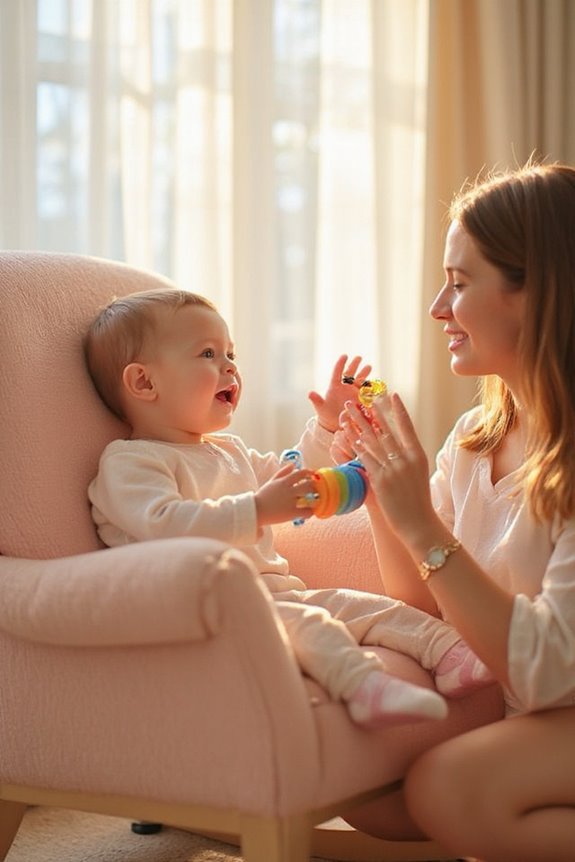
As babies progress in their language development journey, one of the most anticipated milestones is the moment they say their first word. Typically, we can expect this joyful event around 12 months. However, first word timing can vary widely:
- Some little ones might surprise us by saying their first words as early as 9 or 10 months.
- Others may take their time, speaking their first words by 14 or even 18 months.
It’s important to remember that speech readiness is influenced by various factors, including the child’s environment and individual development. Up to 75% of babies will have spoken their first word by 10 months, so don’t worry if yours is a bit later; every child has their unique timeline!
Factors Influencing When First Words Occur

Understanding the factors that influence when babies say their first words can help us set realistic expectations and provide appropriate support.
Several key influences shape this milestone:
- Genetic Influences: Genetics can dictate speech timing.
- Environmental Impacts: Language-rich surroundings boost early speech.
- Gender Differences: Boys may face more speech delays than girls.
- Health Considerations: Hearing impairments or neural development issues can slow progress.
- Personality Traits: More vocal babies might speak sooner, while quieter ones may take their time.
- Social Interactions: Encouraging back-and-forth conversations fosters language skills.
Consistency in First Words Across Cultures
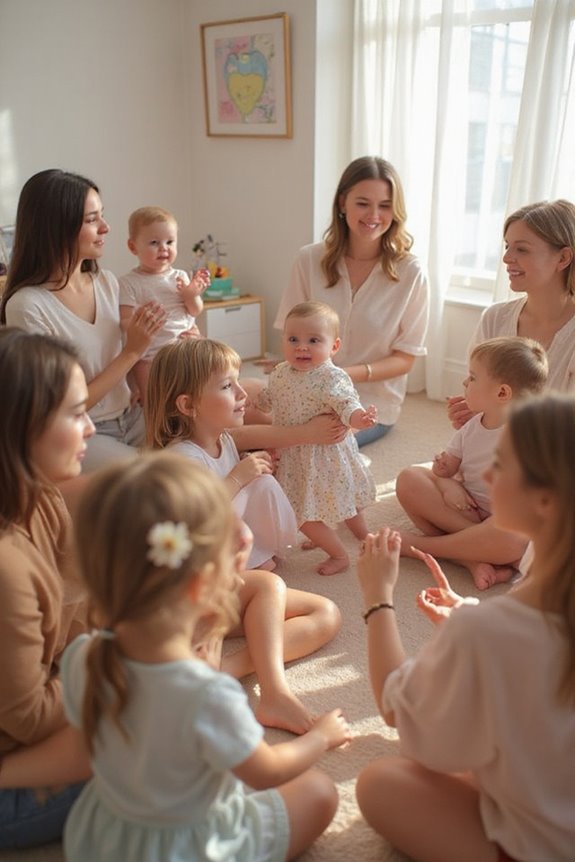
Common Human Experiences: Family and social interactions are fundamental to all cultures. It’s fascinating to see consistency in first words across the globe. Most children, regardless of their background, often start with similar early word patterns.
- Family Members: Words like *mom* and *dad* are universal.
- Social Routines: Greetings like *hi* and *bye* emerge early.
- Animals & Food: Names for common animals, such as *dog,* and basic foods, like *banana,* are popular.
This consistency suggests that cognitive development drives our cross-cultural vocabulary. Even when specific words vary, these fundamental categories remain, reflecting a shared human experience. So, as your little one begins to speak, remember, they’re part of a beautiful tapestry of language development that transcends borders.
The Importance of Linguistic Environment
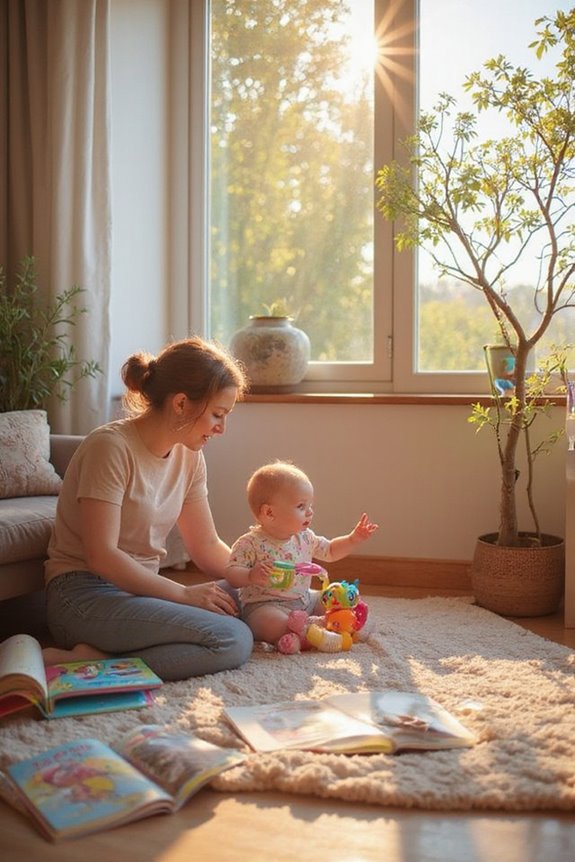
The linguistic environment surrounding a child plays a pivotal role in shaping their language development. We all want our little ones to thrive, and creating a rich linguistic environment is essential. Here are some key factors to consider:
- Amount of Speech: The more words children hear, the better. Engaging conversations matter.
- Quality of Speech: Diverse and reciprocal interactions enhance their language skills.
- Linguistic Diversity: Exposing children to various accents and languages boosts adaptability.
- Environmental Cues: A clutter-free, interactive space helps them focus on learning new words.
What Parents Can Expect in Vocabulary Development
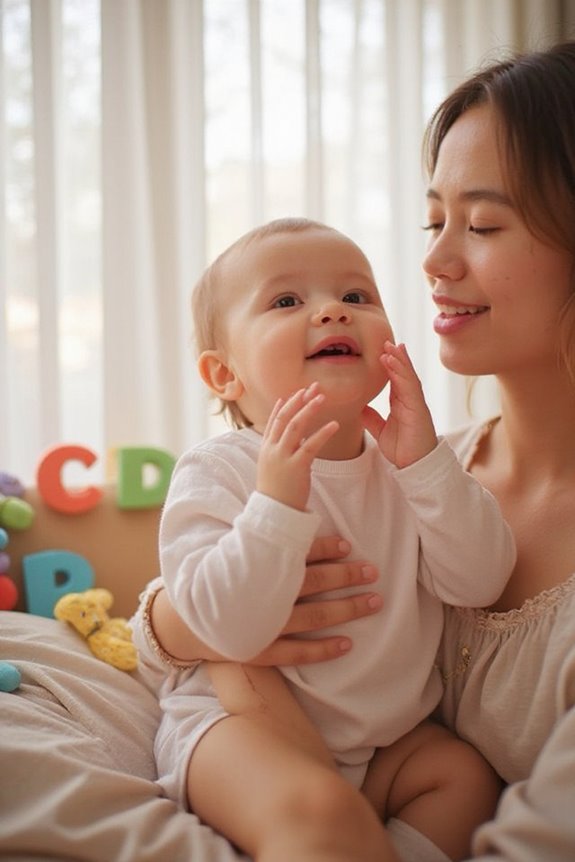
As we watch our little ones grow, it’s natural to wonder what milestones they’ll reach in vocabulary development. In the first year, we can expect significant progress in vocabulary comprehension.
- Birth to 6 Months: They’ll start recognizing sounds and intonations of our language.
- 6 to 9 Months: Our babies may respond to familiar phrases, like waving when they hear “bye-bye.”
- 12 Months: Many understand around 20 words, with comprehension doubling by 18 months.
It’s important to remember that language diversity means each child develops at their own pace. Some will grasp new words quickly, while others may take their time. Engaging with them through gestures and sounds lays a solid foundation for future language skills.
Supporting Your Child’s Language Growth
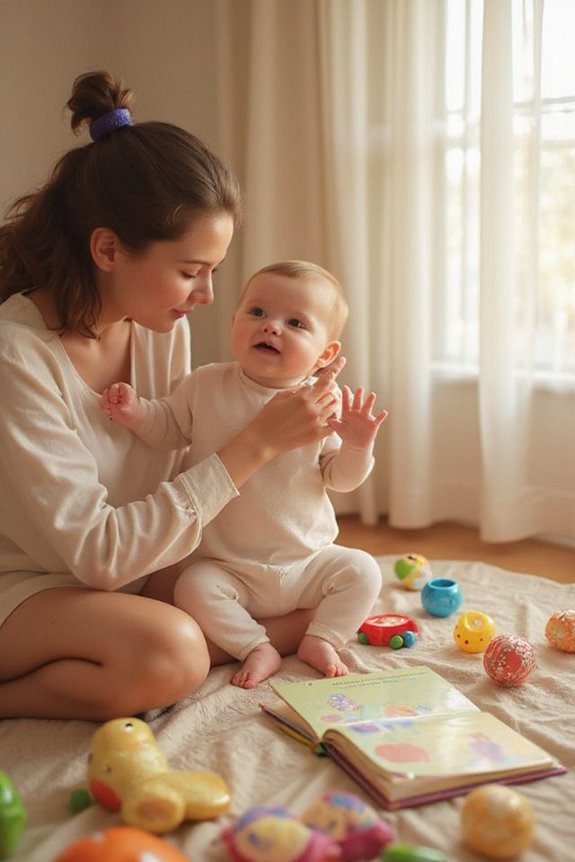
Supporting our child’s language growth is crucial, especially since early communication skills lay the groundwork for future learning. Here are some ways we can nurture this development:
- Talk frequently: Engage in conversations daily, encouraging our little ones to respond.
- Incorporate baby sign language: This helps bridge communication gaps before they can speak.
- Interactive play: Activities like playing with sound-making toys can stimulate auditory exploration.
- Read together regularly: Sharing books introduces new vocabulary in an enjoyable way.
- Use expressive tones and gestures: This enhances understanding and keeps them engaged.
When to Seek Professional Guidance
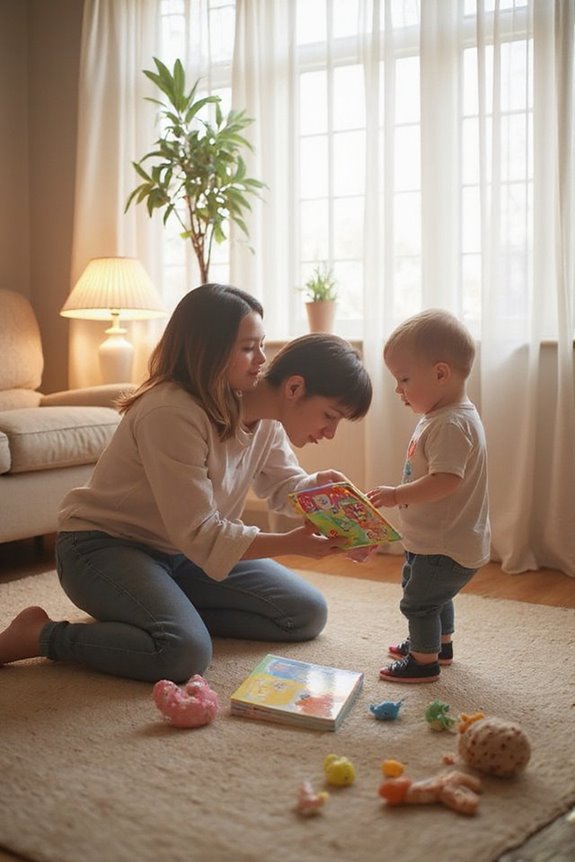
When should we consider seeking professional guidance for our child’s language development? If we notice any red flags, it’s essential to act. Here are some key indicators:
- No babbling by 7 months.
- Lack of gestures or attempts to communicate by 12 months.
- Not responding to their name or environmental sounds by 12 months.
- No understanding of simple words like “no” by 18 months.
- Regression in previously acquired skills.
If our child shows these signs, a professional evaluation can provide clarity and support. Early intervention can make a significant difference, so let’s trust our instincts as parents. We want the best for our little ones, and seeking help is a proactive step towards ensuring their healthy language development.
Frequently Asked Questions
What Are Some Examples of Typical First Words?
Let’s explore typical first words! We often notice baby vocabulary includes sweet terms like “mama” and “dada,” alongside greetings. These common milestones reflect our little ones’ growing understanding of their world. Isn’t it magical?
How Can I Encourage My Baby to Talk?
Did you know babies typically understand around 20 words by 12 months? Through playful interactions and reading together, we can create a nurturing environment that sparks their interest in talking and exploring language.
What if My Baby Doesn’T Say a Word by 12 Months?
If our baby doesn’t say a word by 12 months, it’s essential to remember that language milestones vary. Speech delays are common, so let’s stay patient and seek guidance if we’re concerned.
Are There Any Toys That Promote Early Language Development?
We can’t believe how much language-rich books and interactive playthings can transform our little ones! These treasures ignite imagination and spark conversations, making playtime a delightful adventure that nurtures their early language development.
How Can I Tell if My Baby Understands More Words Than They Say?
To tell if our baby understands more than they say, we can observe nonverbal cues and baby gestures. If they respond to their name or point at objects, it’s a good sign of comprehension.

